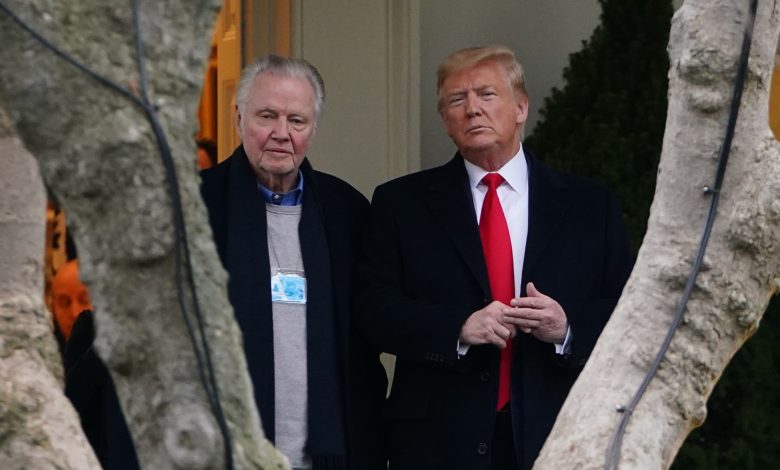Trump foreign film tariff proposal came via actor Jon Voight, allies

FILE PHOTO: U.S. President Donald Trump (R) stands with actor Jon Voight outside the Oval Office before departing from the South Lawn of the White House in Washington, DC on January 28, 2020.
Mandel Ngan | AFP | Getty Images
The actor Jon Voight and his manager submitted a proposal to President Donald Trump that included the idea of imposing tariffs on films produced outside the United States, the two men said Monday.
Shortly after the men met with Trump, the president announced Sunday that he was authorizing the Commerce Department and the U.S. trade representative to “immediately begin the process of instituting a 100% Tariff on any and all Movies coming into our Country that are produced in Foreign Lands.”
Trump did not detail how those tariffs would be implemented.
But his announcement on Truth Social sparked panic and confusion across Hollywood studios and streaming services.
Concerns about the potential tariffs briefly dragged down share prices Monday for companies like Walt Disney Co. and Netflix.
Both Trump and the White House on Monday walked back the idea that the tariffs were certain to be adopted.
Voight, in a statement Monday, said, “We look forward to working with the administration, the unions, studios, and streamers to help form a plan to keep our industry healthy and bring more productions back to America.”
“By creating the right environment through smart incentives, updated policies, and much-needed support, we can ensure that American production companies thrive, more jobs stay here at home, and Hollywood once again leads the world in creativity and innovation,” he added.
Voight and his manager, Steven Paul, submitted a “comprehensive plan” to Trump about “what changes need to be made to increase domestic film production,” Paul’s company SP Global Media said Monday.
Actor Jon Voight attends the Commander in Chief inaugural ball on January 20, 2025 in Washington, DC.
Andrew Harnik | Getty Images
The plan included “federal tax incentives, significant changes to several tax codes, the establishment of co-production treaties with foreign countries, and infrastructure subsidies for theater owners, film and television production companies, and post-production companies,” the firm said.
“The proposal also includes a focus on job training, and tariffs in certain limited circumstances,” the firm said.
Voight, Paul and another advisor also met in person with Trump at Mar-A-Lago to discuss the plan over the weekend.
Following uproar over his post late Sunday, Trump dialed back his rhetoric on Monday.
Trump said he would ask Hollywood studios if “they’re happy” with his proposal to impose tariffs of 100% on films made outside of the United States.
“I’m not looking to hurt the industry, I want to help the industry,” Trump told reporters at the White House.
“So we’re going to meet with the industry,” he said. “I want to make sure they’re happy with it because we’re all about jobs.”
White House spokesman Kush Desai said that “no final decision on foreign film tariffs have been made.”
“The Administration is exploring all options to deliver on President Trump’s directive to safeguard our country’s national and economic security while Making Hollywood Great Again,” he said.
Trump also told reporters Monday that the U.S film industry “has been decimated by other countries taking them out, and also by incompetence, like in Los Angeles, the governor [Gavin Newsom] is a grossly incompetent man, he’s just allowed it to be taken away from.”
“Hollywood doesn’t do very much of that business, they have the nice sign, and everything’s good, but they don’t do very much,” Trump said.
A spokesperson for Newsom, in a statement, said, “Governor Newsom continues to champion California’s iconic film and television industry — recognizing it as a cornerstone of the state’s economy, one that sustains hundreds of thousands of good-paying jobs across every sector around the state.”
“His plan to more than double the state’s film and television tax credit reflects a commitment to keeping production here at home, supporting workers and maintaining California’s global leadership in entertainment,” the spokesperson said. “If the President announces a proposal with more details, we will review it.”
Spending on films and television series made in the United States has been dropping. But all major U.S.-based film companies make movies overseas, complicating the questions of how a tariff on such films would be applied, and who it would benefit.
“Tariffs typically apply to the import of ‘goods,’ so a tariff on DVD imports is easy to enforce and a tariff on intellectual property is nearly impossible to enforce,” Alicia Reese, analyst at Wedbush wrote in a research note on Monday.
The amount of money spent in the United States on films and TV series budgeted to $10 million or more has sharply fallen since 2021, while there has been an uptick in spending on films produced in the rest of the world.
In 2021, the so-called committed spend on such films and TV series in the U.S. was nearly $26 billion, according to the company ProdPro, which tracks studio spending. That fell to $19 billion in 2024.
In 2021, the committed spend on such productions in the rest of the world was nearly $23 billion. That rose to $24.6 billion last year, ProdPro data showed.
In 2021, the number of projects budgeted for $10 million or more that were made in the U.S. was 466. That fell to 304 such films in 2024, according to that data.
Conversely, the number of such projects made in the rest of the world grew from 420 in 2021 to 489 in 2024, according to ProdPro.
“According to ProdPro’s 2025 survey of studio executives, when asked what are the top criteria they consider when selecting a filming location, tax incentives is the # 1 consideration,” ProdPro said in a statement to CNBC.
“Other key factors include creative decisions, infrastructure, and local crew,” the company said. “Our tracking shows that the US is seeing a decline in absolute numbers and market share, indicating that the productions are moving to other countries including Australia, [New Zealand], among other hubs with attractive incentives.”
ProdPro said that foreign exchange rates “have also disadvantaged US-based productions given the strength of the US dollar relative to other markets.”
” In our survey of studio executives regarding their preferred production locations for 2025-26, the top five choices were all outside the United States,” the company said.
— CNBC’s Julia Boorstein and NBC News’ Daniel Arkin contributed to this story



